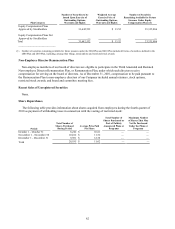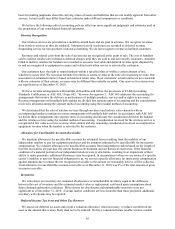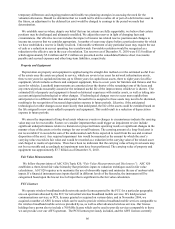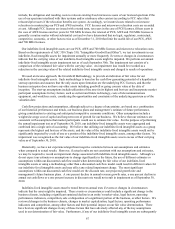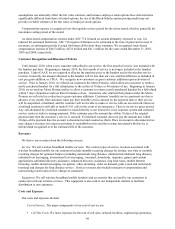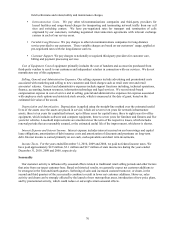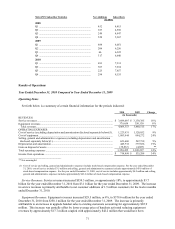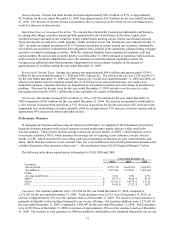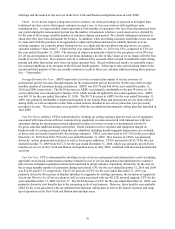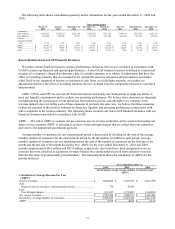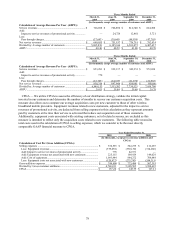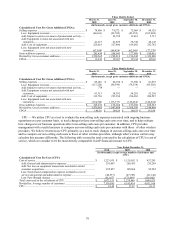Metro PCS 2010 Annual Report Download - page 79
Download and view the complete annual report
Please find page 79 of the 2010 Metro PCS annual report below. You can navigate through the pages in the report by either clicking on the pages listed below, or by using the keyword search tool below to find specific information within the annual report. 69
assumptions can materially affect the fair value estimate, and because employee stock options have characteristics
significantly different from those of traded options, the use of the Black-Scholes option pricing model may not
provide a reliable estimate of the fair value of employee stock options.
Compensation expense is recognized over the requisite service period for the entire award, which is generally the
maximum vesting period of the award.
As share-based compensation expense under ASC 718 is based on awards ultimately expected to vest, it is
reduced for estimated forfeitures. ASC 718 requires forfeitures to be estimated at the time of grant and revised, if
necessary, in subsequent periods if actual forfeitures differ from those estimates. We recognized stock-based
compensation expense of $46.5 million, $47.8 million and $41.1 million for the years ended December 31, 2010,
2009 and 2008, respectively.
Customer Recognition and Disconnect Policies
Until January 2010, when a new customer subscribed to our service, the first month of service was included with
the handset purchase. Beginning in January 2010, the first month of service is no longer included in the handset
purchase. Under GAAP, we are required to allocate the purchase price to the handset and to the wireless service
revenue. Generally, the amount allocated to the handset will be less than our cost, and this difference is included in
cost per gross addition, or CPGA. We recognize new customers as gross customer additions upon activation of
service. Prior to January 2010, we offered our customers the Metro Promise, which allowed a customer to return a
newly purchased handset for a full refund prior to the earlier of 30 days or 60 minutes of use. Beginning in January
2010, we revised our Metro Promise policy to allow a customer to return a newly purchased handset for a full refund
within 7 days of purchase and less than 60 minutes of use. Customers who returned their phones under the Metro
Promise are reflected as a reduction to gross customer additions. Customers’ monthly service payments are due in
advance every month. Our customers must pay their monthly service amount by the payment date or their service
will be suspended, or hotlined, and the customer will not be able to make or receive calls on our network. However,
a hotlined customer is still able to make E-911 calls in the event of an emergency. There is no service grace period.
Any call attempted by a hotlined customer is routed directly to our interactive voice response system and customer
service center in order to arrange payment. If the customer pays the amount due within 30 days of the original
payment date then the customer’s service is restored. If a hotlined customer does not pay the amount due within
30 days of the payment date the account is disconnected and counted as churn. Once an account is disconnected we
may charge a reconnect fee upon reactivation to reestablish service and the revenue associated with this fee is
deferred and recognized over the estimated life of the customer.
Revenues
We derive our revenues from the following sources:
Service. We sell wireless broadband mobile services. The various types of service revenues associated with
wireless broadband mobile for our customers include monthly recurring charges for airtime, one-time or monthly
recurring charges for optional features (including nationwide long distance, unlimited international long distance,
unlimited text messaging, international text messaging, voicemail, downloads, ringtones, games and content
applications, unlimited directory assistance, enhanced directory assistance, ring back tones, mobile Internet
browsing, mobile instant messaging, navigation, video streaming, video on demand, push e-mail and nationwide
roaming) and charges for long distance service. Service revenues also include intercarrier compensation and
nonrecurring reactivation service charges to customers.
Equipment. We sell wireless broadband mobile handsets and accessories that are used by our customers in
connection with our wireless services. This equipment is also sold to our independent retailers to facilitate
distribution to our customers.
Costs and Expenses
Our costs and expenses include:
Cost of Service. The major components of our cost of service are:
•Cell Site Costs. We incur expenses for the rent of cell sites, network facilities, engineering operations,





